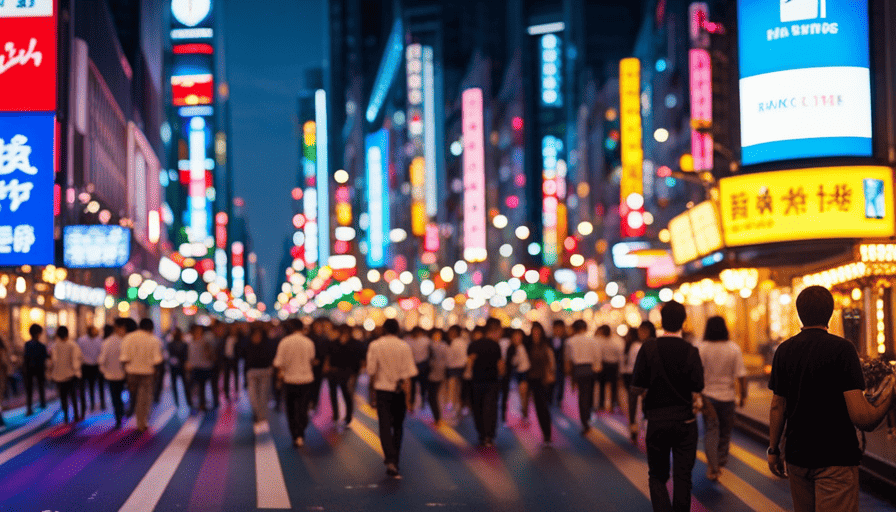Have you ever found yourself belting out your favorite songs in a dimly lit room, surrounded by friends and strangers alike? If so, you’ve experienced the joy of karaoke. But have you ever stopped to think about what the term “karaoke” actually means in Japanese? Let’s explore the fascinating world of this cultural phenomenon and discover its origins.
Imagine this: You’re in Tokyo, stepping into a bustling karaoke bar filled with eager patrons. As you select your song from an extensive catalog, you can’t help but wonder about the origins of this popular pastime.
Karaoke, derived from the Japanese words ‘kara’ meaning ’empty’ and ‘oke’ meaning ‘orchestra,’ was invented in Japan during the 1970s.
In this article, we will explore not only the history and cultural significance of karaoke in Japan but also its evolution into a global sensation. We’ll delve into different types of karaoke experiences, discuss technological advancements that have revolutionized the industry, and even highlight famous karaoke songs that have captured hearts across Japan.
Prepare to uncover how karaoke has impacted not only individuals but also the music industry as a whole. And perhaps most importantly, discover why karaoke is more than just singing – it’s a form of self-expression that transcends borders and continues to bring people together worldwide.
Key Takeaways
- The word ‘karaoke’ comes from the Japanese words ‘kara’ meaning ’empty’ and ‘oke’ meaning ‘orchestra.’
- Karaoke originated in Japan in the 1970s and has become deeply ingrained in Japanese culture.
- Karaoke has had a significant economic impact, becoming a multi-billion dollar industry in Japan and attracting tourists to countries like Japan, South Korea, and Thailand.
- Karaoke serves as a form of self-expression and creativity, allowing individuals to experiment with vocal techniques and add personal flair to songs.
The Origins of Karaoke in Japan
The rich history of karaoke in Japan will leave you amazed and captivated. Karaoke, which means ’empty orchestra’ in Japanese, originated in the 1970s and quickly became a cultural phenomenon.
The concept was developed by Daisuke Inoue, a musician who wanted to provide a way for people to sing along to popular songs without needing live accompaniment. He created the first karaoke machine, which featured a tape recorder hooked up to an amplifier and microphone.
Karaoke’s origins and history are deeply rooted in Japanese culture. It provided an opportunity for people of all ages to gather together and enjoy singing their favorite songs. Initially, it was mainly available in bars and clubs but eventually spread to karaoke boxes, dedicated establishments where people could rent private rooms equipped with karaoke machines.
The cultural significance of karaoke cannot be overstated. It has become an integral part of Japanese society, with millions of people regularly participating in this beloved pastime. Karaoke has had a significant impact on the music industry as well, influencing popular music trends and creating opportunities for aspiring singers.
As we transition into discussing karaoke’s cultural significance in Japan further, it becomes clear that this form of entertainment has truly become ingrained in the fabric of Japanese society without missing a beat.
Karaoke’s Cultural Significance in Japan
When it comes to karaoke in Japan, you’ll discover that it’s more than just a form of entertainment. It’s a social activity deeply ingrained in the fabric of Japanese culture.
Whether it’s singing your heart out with friends or participating in karaoke competitions, karaoke brings people together and creates lasting memories.
Additionally, karaoke has become an integral part of Japanese pop culture, with numerous artists gaining fame through their performances at karaoke establishments and TV talent shows.
So if you’re looking to immerse yourself in Japanese culture, don’t miss out on experiencing the vibrant world of karaoke.
Karaoke as a Social Activity
Imagine yourself stepping into a vibrant karaoke bar filled with friends singing their hearts out, creating an electrifying atmosphere. Karaoke is not just about having fun; it’s also therapeutic. Singing can relieve stress and improve mood, making karaoke a popular activity for socializing and bonding with others.
Additionally, karaoke competitions are held regularly in Japan, showcasing the talent and passion of individuals who aspire to be professional singers. These competitions provide a platform for aspiring artists to showcase their skills and gain recognition within the industry.
As you delve deeper into the world of karaoke in Japanese pop culture, you’ll discover its influence on music trends and how it has become an integral part of everyday life in Japan.
Karaoke in Japanese Pop Culture
Step into the vibrant world of Japanese pop culture and discover how karaoke has become an integral part of everyday life, influencing music trends and providing a platform for aspiring artists to showcase their skills.
Karaoke competitions are a popular phenomenon in Japan, where talented individuals compete against each other to demonstrate their singing abilities. These competitions not only attract participants from all walks of life but also have a dedicated fan base that eagerly follows the performances and supports their favorite contestants.
Additionally, karaoke’s influence extends beyond live performances as it has inspired a range of karaoke-themed merchandise, including clothing, accessories, and even video games. This demonstrates the deep impact that karaoke has had on Japanese society, cementing its place as a cultural icon.
As we explore further into the evolution of karaoke into a global phenomenon, it becomes evident how this once niche activity has captured hearts worldwide.
Karaoke’s Evolution into a Global Phenomenon
To truly understand the global phenomenon that karaoke has become, you must delve into its evolution and how it has captivated people from all corners of the world. Karaoke’s popularity has not only had a significant economic impact but also influenced tourism in many countries.
-
Economic Impact: Karaoke is big business. From the creation of specialized machines and equipment to the establishment of karaoke bars and venues, it has created a thriving industry. The sale and rental of karaoke machines alone generate billions of dollars worldwide each year.
-
Influence on Tourism: Karaoke’s popularity attracts tourists who want to experience this unique form of entertainment. Japan, being the birthplace of karaoke, sees an influx of visitors eager to try out their singing skills in authentic settings. Other countries have embraced this trend as well, with popular tourist destinations like South Korea and Thailand offering karaoke experiences that cater to both locals and international travelers.
-
Global Karaoke Competitions: Karaoke competitions have become increasingly popular on an international scale. These events showcase talented individuals from various backgrounds coming together to compete for recognition and prizes. They provide opportunities for aspiring singers to gain exposure and potentially launch their careers in music.
As we move into discussing different types of karaoke, it is important to note how this global phenomenon continues to evolve and capture the hearts of people worldwide.
Different Types of Karaoke
One fascinating aspect of karaoke’s evolution is the diverse range of types available, each offering a unique twist on this beloved form of entertainment. From traditional karaoke bars to high-tech karaoke machines, there are various options for enthusiasts to choose from. Let’s take a closer look at three different types of karaoke experiences in the table below:
| Type | Description |
|---|---|
| Karaoke Bars | These establishments provide private rooms or open spaces where patrons can sing their hearts out with friends while enjoying food and drinks. Some bars even offer karaoke competitions as a way to showcase talent and entertain guests. |
| Karaoke Machines | These portable devices allow individuals to enjoy karaoke anywhere, anytime. With built-in screens and song libraries, users can select their favorite tunes and sing along using microphones. Perfect for parties or solo performances! |
| Online Karaoke Apps | The digital era has given rise to online platforms that offer virtual karaoke experiences. Users can access extensive song catalogs, record their performances, and even participate in global karaoke competitions from the comfort of their own homes. |
As technology continues to advance, so does the world of karaoke. Now that you understand the different types available, let’s explore how technological advancements have further enhanced this popular pastime in the next section about ‘technological advancements in karaoke.’
Technological Advancements in Karaoke
Imagine being able to transform your living room into a state-of-the-art karaoke studio, complete with interactive features and professional-grade sound systems. With the advancements in technology, virtual karaoke experiences have become increasingly popular. This is just the beginning of what the future holds for karaoke technology.
Virtual karaoke experiences allow you to sing your favorite songs without leaving the comfort of your own home. Through specialized apps or online platforms, you can access an extensive library of songs and choose from various customizable settings. Some platforms even offer features like real-time pitch correction and vocal enhancement, giving you a truly immersive singing experience.
But it doesn’t stop there. The future of karaoke technology promises even more exciting developments. Imagine holographic displays that bring your favorite artists right into your living room or virtual reality headsets that transport you to iconic concert venues around the world. These advancements will undoubtedly revolutionize how we enjoy karaoke.
As we transition to discussing ‘karaoke etiquette in Japan’, it’s important to understand how these technological advancements have shaped our perception and experience of this beloved pastime.
Karaoke Etiquette in Japan
When visiting karaoke bars in Japan, it’s important to adhere to proper behavior guidelines. This includes respecting others’ turns and not hogging the microphone for too long.
Additionally, there are singing tips and techniques that can enhance your performance. These include warming up your voice beforehand and choosing songs that suit your vocal range.
By following these etiquette rules and utilizing singing techniques, you can fully enjoy the karaoke experience in Japan.
Proper Behavior at Karaoke Bars
Behave like a rockstar at karaoke bars by belting out your favorite tunes while respecting the etiquette of the venue. When it comes to proper behavior at karaoke bars in Japan, there are a few key things to keep in mind. First and foremost, make sure you dress appropriately. While there may not be strict dress codes, it’s best to avoid overly casual attire and opt for something more presentable. Additionally, consider embracing karaoke party themes if they are offered at the venue. This can add an extra element of fun and excitement to your experience.
To help visualize these ideas, here is a table showcasing proper behavior at karaoke bars:
| Proper Attire | Karaoke Party Themes |
|---|---|
| Presentable | Fun & Exciting |
| Avoid casual | Themed Costumes |
By following these guidelines, you’ll ensure that you’re behaving respectfully while still having a great time singing your heart out. Now, let’s move on to some singing tips and techniques that will take your karaoke performances to the next level!
Singing Tips and Techniques
To really make your karaoke performance shine, let’s dive into some singing tips and techniques that’ll have you sounding like a superstar.
Before you start belting out your favorite tunes, it’s important to warm up your vocal cords. Simple exercises like humming, lip trills, and gentle scales can help loosen up your voice and prevent strain.
Once warmed up, choosing the right song is crucial for a successful karaoke experience. Consider selecting a song that suits your vocal range and showcases your strengths as a singer. Whether you prefer ballads or upbeat tracks, finding the perfect song will enhance your performance and leave a lasting impression on the audience.
Now that you know how to prepare yourself vocally and choose the right song, let’s move on to exploring famous karaoke songs in Japan without missing a beat.
Famous Karaoke Songs in Japan
One of the most popular karaoke songs in Japan is ‘Sukiyaki’ by Kyu Sakamoto. This iconic song has been a staple in Japanese karaoke bars for decades. When you step into a karaoke establishment in Japan, you can expect to hear this timeless classic being belted out by both young and old singers alike.
The Japanese take their karaoke seriously, and there are many famous karaoke songs that have gained popularity not only within the country but also internationally. Some other well-known choices include ‘My Heart Will Go On’ by Celine Dion and ‘Bohemian Rhapsody’ by Queen. These songs have become synonymous with the karaoke experience and are often performed at karaoke competitions in Japan.
When you imagine yourself singing ‘Sukiyaki’ or any of these famous tunes at a lively Japanese karaoke bar, it paints a picture of camaraderie, laughter, and unforgettable memories. The atmosphere is electric as people take turns showcasing their vocal talents while friends cheer them on from their seats.
This vibrant karaoke culture has had a significant impact on the music industry, shaping trends and providing aspiring artists with platforms to showcase their skills.
In our next section about ‘karaoke’s impact on the music industry,’ we will explore how this beloved pastime has influenced musical careers around the world without missing a beat.
Karaoke’s Impact on the Music Industry
Now that you know some of the famous karaoke songs in Japan, let’s dive into the impact karaoke has had on the music industry.
Karaoke’s economic impact cannot be underestimated. It has become a multi-billion dollar industry, with karaoke bars and rental services popping up all over Japan. People are willing to spend money to have a night of fun and entertainment with their friends, belting out their favorite tunes.
But it’s not just about the money. Karaoke has also influenced how people consume music. In the past, people would buy albums or singles to listen to their favorite songs at home. But now, with karaoke readily available, people can experience the joy of singing along with their favorite artists in a social setting.
Karaoke has also given rise to new opportunities for aspiring musicians. Many artists have been discovered through karaoke competitions or by performing at karaoke events. This platform allows them to showcase their talents and gain recognition from both fans and industry professionals.
As we delve further into this topic, we will explore how karaoke serves as a form of self-expression for many individuals, allowing them to unleash their inner superstars without judgment or inhibition.
Karaoke as a Form of Self-Expression
Karaoke allows you to unleash your inner superstar, providing a unique outlet for self-expression and creativity. Singing your favorite songs in front of an audience, whether it’s at a karaoke bar or in the comfort of your own home, can be an exhilarating experience. But karaoke is more than just fun and entertainment; it also offers numerous benefits.
One of the main benefits of karaoke is its therapeutic effect on individuals. Singing has been proven to reduce stress levels and release endorphins, which can improve mood and overall well-being. Karaoke therapy is even used as a form of rehabilitation for people with speech disorders or social anxiety. It provides a safe space for individuals to express themselves through music without fear of judgment.
Furthermore, karaoke encourages creativity by allowing you to interpret songs in your own style. You can experiment with different vocal techniques, add personal flair to the lyrics, and even create unique arrangements. This freedom fosters self-expression and boosts confidence in one’s artistic abilities.
The enduring legacy of karaoke extends beyond mere entertainment value. Its benefits range from stress relief to fostering creativity and self-expression. Now that we’ve explored the impact of karaoke as a form of self-expression, let’s delve into its enduring legacy in Japan and beyond.
Conclusion: The Enduring Legacy of Karaoke in Japan and Beyond
Immerse yourself in the enchanting world of karaoke and discover the everlasting impact it has had on Japan and beyond. Karaoke, meaning ’empty orchestra’ in Japanese, has become a cultural phenomenon that transcends borders and brings people together through music.
One of the enduring legacies of karaoke is its significant economic impact. Karaoke establishments have flourished not only in Japan but also worldwide, contributing to job creation, tourism, and revenue generation.
Moreover, karaoke has a profound psychological effect on individuals. Singing allows people to express their emotions, boost their self-confidence, and relieve stress. The act of performing in front of others fosters a sense of belonging and connection within a community. In Japan particularly, where societal expectations often emphasize conformity and harmony, karaoke offers an outlet for personal expression.
Karaoke’s popularity continues to grow globally due to its accessibility and inclusivity. It appeals to people from all walks of life who want to showcase their talents or simply enjoy singing along with friends. Whether it’s at private parties or public venues, karaoke remains a beloved pastime that promotes camaraderie and joy.
Karaoke’s enduring legacy lies not only in its economic impact but also in its ability to provide an outlet for self-expression and foster social connections. So next time you find yourself belting out your favorite tunes at a karaoke bar or hosting a virtual sing-along with friends, remember the profound impact this Japanese invention has had on the world stage.
Frequently Asked Questions
What is the history of karaoke outside of Japan?
Karaoke has had a significant impact on the Western music industry and holds cultural significance in different regions. Introduced to the West in the 1970s, karaoke quickly gained popularity as a form of entertainment. It allowed people to sing along with popular songs without having to be professional singers. This phenomenon created opportunities for aspiring artists and influenced the development of talent shows like American Idol.
Karaoke also became a social activity that brought people together, fostering a sense of community and fun across various cultures.
How has karaoke impacted the popularity of Japanese music worldwide?
Karaoke has had a significant impact on the popularity of Japanese music worldwide. Its introduction coincided with the rise of J-pop, allowing fans to sing along to their favorite songs and feel connected to the artists.
Karaoke also played a crucial role in promoting Japanese culture abroad, highlighting the unique musical traditions and fostering an appreciation for Japan’s rich heritage.
Today, karaoke remains a beloved cultural phenomenon that continues to shape the global music industry.
What are some famous karaoke songs from other countries?
Famous karaoke songs from other countries offer a unique cross-cultural karaoke experience. These songs have become popular choices for karaoke enthusiasts around the world, transcending language barriers and creating memorable moments.
Classics like ‘My Way’ by Frank Sinatra or ‘Bohemian Rhapsody’ by Queen are often belted out in karaoke bars worldwide. Other favorites include ‘Livin’ on a Prayer’ by Bon Jovi and ‘I Will Always Love You’ by Whitney Houston.
These international hits bring people together, fostering a global love for karaoke.
How has karaoke evolved in terms of technology and equipment?
Karaoke has evolved significantly in terms of technology and equipment. With advancements in sound systems, audiovisual displays, and software applications, karaoke machines have become more sophisticated and user-friendly.
The introduction of wireless microphones and portable systems has made it easier for people to enjoy karaoke at home or on the go. Additionally, the integration of social media platforms has allowed for sharing performances online, further expanding its reach.
This evolution has had a profound impact on the music industry, creating new avenues for aspiring singers and contributing to the popularity of certain songs.
Are there any specific rules or etiquette when it comes to karaoke in different countries?
When it comes to karaoke etiquette in different cultures, there are some fascinating cultural differences in karaoke traditions.
For example, did you know that in Japan, it’s considered impolite to clap or applaud during a karaoke performance? Instead, the audience shows their appreciation by silently nodding or giving a thumbs up. This custom reflects the Japanese value of modesty and not drawing attention to oneself.
Isn’t that interesting how karaoke customs can vary across the globe?
Conclusion
So there you have it, the enduring legacy of karaoke in Japan and beyond. From its humble origins in a small bar in Kobe to becoming a global phenomenon, karaoke has truly come a long way.
Its cultural significance in Japan cannot be overstated, as it has become a popular form of self-expression and entertainment. With technological advancements, karaoke has evolved into different types and continues to shape the music industry.
Whether you’re belting out your favorite tunes or just enjoying the show, karaoke is here to stay. So grab that microphone and let your inner superstar shine!










